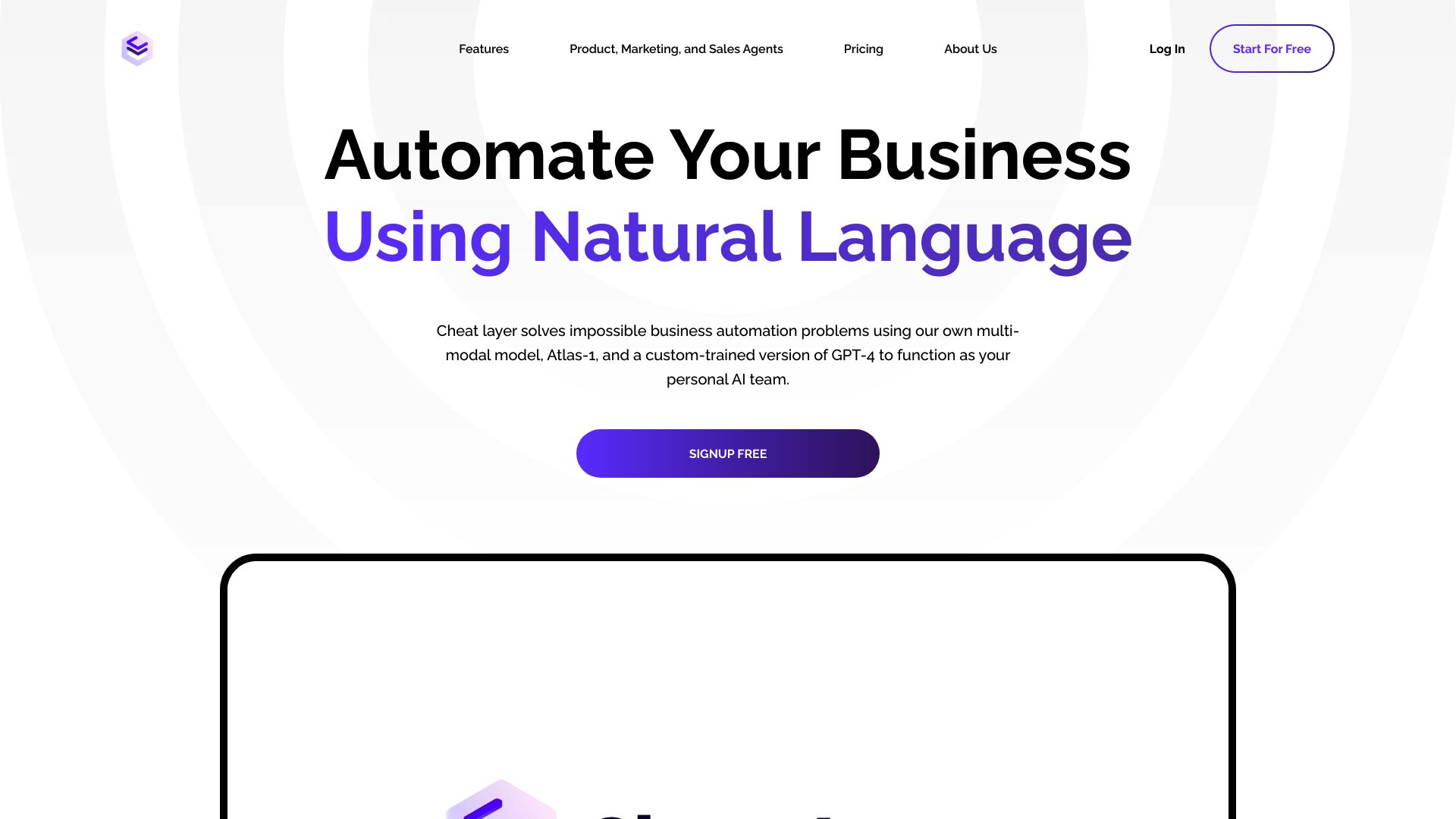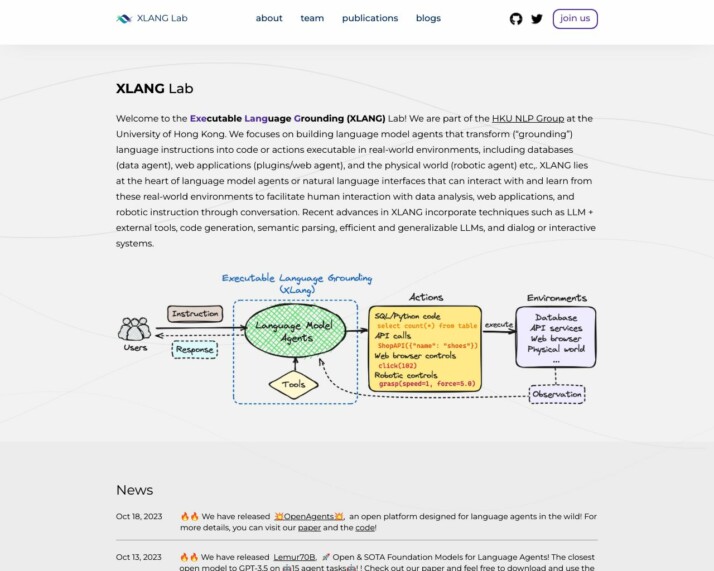AI platforms are transforming how businesses automate processes and leverage intelligent systems. This comparison explores two innovative solutions — Cheat Layer vs. OpenAgents — alongside SmythOS, our comprehensive AI development platform. We’ll examine how each tackles the challenges of creating and deploying AI agents, from natural language interfaces to specialized data analysis tools.
By evaluating key features, deployment options, and enterprise readiness, this review equips decision-makers and developers to choose the AI platform best suited for their unique needs. Whether you’re a startup founder, an enterprise IT leader, or an AI enthusiast, you’ll gain insights into how these platforms can enhance your AI capabilities and streamline workflows.
Cheat Layer Overview
Cheat Layer revolutionizes business automation by harnessing the power of AI. The platform leverages a custom-trained version of GPT-4 and their multi-modal model Atlas-1 to solve complex automation challenges using natural language. This approach makes advanced automation accessible to users without technical expertise, democratizing AI-driven business solutions.
At the core of Cheat Layer’s offerings is the Project Atlas Framework. This innovative system allows users to generate automations of unlimited complexity through simple conversations. By interacting with the system as if speaking to an engineer, users can create end-to-end solutions effortlessly. The platform’s Semantic Targets feature ensures automations remain functional even when services update their designs, providing longevity and accuracy.
Cheat Layer revolutionizes business automation by harnessing the power of AI… making advanced automation accessible to users without technical expertise, democratizing AI-driven business solutions.
Cheat Layer excels in rapid deployment and iteration. The 1-Click Cloud Agents feature enables users to deploy pre-built marketing and sales agents directly from mobile devices, streamlining processes like content generation and lead acquisition. The Live Mode facilitates real-time feedback for iterative product development, ensuring outputs align precisely with intended goals. For users seeking a more hands-on approach, the no-code drag-and-drop editor simplifies automation creation without requiring programming knowledge.

Cheat Layer’s vision extends beyond individual automation tasks. The platform aims to level the playing field in business technology, enabling small businesses to compete with larger firms by leveraging powerful, accessible, and cost-effective automation tools. By removing barriers to business creation and operation, Cheat Layer fosters an environment where quality service and personal relationships drive success, rather than technological disparities.
Cheat Layer’s vision extends beyond individual automation tasks… enabling small businesses to compete with larger firms by leveraging powerful, accessible, and cost-effective automation tools.
While Cheat Layer offers a robust set of features, users should consider their specific needs when evaluating the platform. The emphasis on natural language interaction and pre-built agents may be ideal for those seeking quick deployment and ease of use. However, organizations requiring highly specialized or complex integrations might need to assess the platform’s flexibility in meeting unique requirements. As with any AI-driven solution, the effectiveness of Cheat Layer’s automations will depend on the quality of input and the specific use cases implemented.
OpenAgents Overview
OpenAgents offers an open-source platform for creating, hosting, and managing AI agents. The system revolves around three specialized agents: Data Agent for complex data analysis, Plugins Agent with over 200 integrated tools for daily tasks, and Web Agent for autonomous web browsing.

The Data Agent excels in processing large datasets, generating insights crucial for roles like marketing analytics. With its ability to search, manipulate, and visualize data efficiently, it simplifies complex analytical tasks. The Plugins Agent stands out with its extensive library of over 200 integrated plugins, covering a wide range of activities from weather checks to online shopping. This versatility makes it adaptable to diverse user needs. The Web Agent employs a Chrome extension to automate web navigation, streamlining information access and resource discovery online.
OpenAgents offers an open-source platform for creating, hosting, and managing AI agents. The system revolves around three specialized agents: Data Agent for complex data analysis, Plugins Agent with over 200 integrated tools for daily tasks, and Web Agent for autonomous web browsing.
OpenAgents emphasizes user-friendliness with a web UI and backend server that facilitate easy communication with the agents. This approach makes advanced AI capabilities accessible to non-expert users, bridging the gap between technical complexity and practical application. The platform supports deployment on localhost and allows for the integration of new agents and plugins, enhancing its flexibility.
While OpenAgents offers powerful capabilities, it faces challenges common to open-source platforms. These may include the need for technical expertise in deployment and customization, potential limitations in enterprise-level support, and the ongoing requirement for community-driven updates and improvements. The platform’s reliance on user contributions for expansion and refinement could lead to inconsistencies in feature development and documentation.
OpenAgents positions itself as a versatile solution in the AI agent landscape, particularly appealing to developers, researchers, and businesses seeking customizable AI solutions. Its open-source nature fosters innovation and collaboration but may require users to invest time in understanding and optimizing the platform for their specific needs. As AI technologies evolve, OpenAgents’ adaptability and community support will play crucial roles in maintaining its relevance and effectiveness in real-world applications.
Feature Comparison
SmythOS and OpenAgents both offer robust platforms for AI agent development, but with notable differences in their approaches and capabilities. SmythOS excels in providing a comprehensive, enterprise-ready solution with advanced features for scalability and integration. Its drag-and-drop interface and pre-built API integrations make it accessible to users with varying levels of technical expertise. SmythOS also offers multi-agent orchestration and versatile deployment options, including integration with major cloud platforms and AI models.
OpenAgents, as an open-source platform, focuses on three specialized agents: Data Agent, Plugins Agent, and Web Agent. While this approach offers flexibility for developers and researchers, it may lack some of the enterprise-level features and support found in SmythOS. OpenAgents’ strength lies in its customizability and community-driven development, but it may require more technical expertise to fully utilize and deploy.
In terms of core components, SmythOS provides a more comprehensive suite of tools, including a visual builder, no-code editor, and support for multimodal interactions. Its hosted vector database and extensive API integrations offer a wider range of data processing capabilities. OpenAgents, while powerful in its specialized areas, may not match the breadth of SmythOS’s feature set, particularly in areas like scalable deployment and enterprise-grade security measures.
Security-wise, SmythOS offers robust features like data encryption, OAuth integration, and IP control, which are crucial for enterprise deployments. OpenAgents, being open-source, may require additional configuration and third-party tools to achieve similar levels of security, potentially creating challenges for users seeking out-of-the-box security solutions.
While both platforms offer valuable tools for AI agent development, SmythOS appears to provide a more comprehensive, scalable, and secure solution, particularly suited for enterprise-level applications and users seeking a balance between power and ease of use.
Feature Comparison Table
| Cheat Layer | OpenAgents | SmythOS | |
|---|---|---|---|
| CORE FEATURES | |||
| Visual Builder | ✅ | ❌ | ✅ |
| No-Code Options | ✅ | ❌ | ✅ |
| Agent Work Scheduler | ✅ | ❌ | ✅ |
| SECURITY | |||
| Constrained Alignment | ✅ | ❌ | ✅ |
| IP Control | ❌ | ❌ | ✅ |
| COMPONENTS | |||
| Huggingface AIs | ❌ | ✅ | ✅ |
| Data Lakes | ❌ | ❌ | ✅ |
| DEPLOYMENT OPTIONS (EMBODIMENTS) | |||
| Staging Domains | ✅ | ❌ | ✅ |
| Production Domains | ✅ | ❌ | ✅ |
| Deploy as Scheduled Agent | ✅ | ❌ | ✅ |
| DATA LAKE SUPPORT | |||
| Hosted Vector Database | ❌ | ❌ | ✅ |
| Sitemap Crawler | ✅ | ❌ | ✅ |
| YouTube Transcript Crawler | ✅ | ❌ | ✅ |
Best Alternative to Cheat Layer and OpenAgents
SmythOS stands out as the superior alternative to Cheat Layer and OpenAgents, offering a comprehensive AI automation platform that combines power, flexibility, and ease of use. Our solution addresses the limitations of both competitors while providing a robust set of features designed for enterprise-level applications and individual developers alike.
Unlike Cheat Layer’s focus on business automation and OpenAgents’ specialized agent approach, SmythOS delivers a versatile platform capable of handling an unlimited range of use cases. We offer a visual builder and no-code options that make AI development accessible to users of all skill levels, surpassing the technical barriers present in OpenAgents’ open-source model.
SmythOS delivers a versatile platform capable of handling an unlimited range of use cases… with no-code options that make AI development accessible to users of all skill levels
SmythOS excels in its extensive integration capabilities, supporting a wide array of AI models, APIs, and data sources. This flexibility allows users to create sophisticated AI workflows that seamlessly connect with existing systems and services. Our platform’s ability to deploy agents across various environments, including as APIs, webhooks, and scheduled tasks, provides unmatched versatility compared to the limited deployment options of Cheat Layer and OpenAgents.
Security and scalability set SmythOS apart from its competitors. We implement robust features such as data encryption, OAuth integration, and IP control, ensuring enterprise-grade security that OpenAgents’ open-source nature may struggle to match. Additionally, our hosted vector database and support for data lakes enable efficient handling of large-scale data processing tasks, a capability not explicitly offered by either Cheat Layer or OpenAgents.
By choosing SmythOS, users gain access to a cutting-edge AI platform that combines the best of both worlds – the power and customization of advanced AI technologies with the accessibility and user-friendliness of modern software design. Our solution empowers businesses and developers to create, deploy, and manage AI agents with unprecedented ease and efficiency, making it the clear choice for those seeking to harness the full potential of AI automation.
Conclusion
SmythOS emerges as the standout solution among Cheat Layer, OpenAgents, and itself, offering a comprehensive platform for AI agent development and deployment. While Cheat Layer provides innovative automation tools and OpenAgents offers specialized open-source agents, SmythOS combines enterprise-grade features with user-friendly interfaces, making it the superior choice for businesses and developers alike.
SmythOS excels in its versatility and scalability. The platform’s drag-and-drop interface, coupled with pre-built API integrations, enables users of all technical levels to create sophisticated AI workflows. Its support for multi-agent orchestration and diverse deployment options, including major cloud platforms and AI models, sets it apart in terms of flexibility and power.
Security and compliance are paramount in SmythOS, with robust features like data encryption, OAuth integration, and IP control. These enterprise-level security measures make it particularly suitable for businesses with stringent data protection requirements. The platform’s ability to seamlessly integrate with existing systems and its extensive range of over 300,000 integrations further solidify its position as a leading solution in the AI agent landscape.
For those ready to experience the future of AI agent development, create a free SmythOS account today. You’ll gain access to unlimited agent creation, a 30-day money-back guarantee, and the ability to automate complex workflows with ease. Explore our diverse range of AI-powered agent templates to jumpstart your projects and discover how SmythOS can revolutionize your approach to AI integration. With SmythOS, you’re not just adopting a tool; you’re embracing a platform that will transform your business operations and drive innovation.